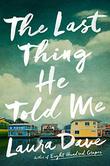The setup of Laura Dave’s bestselling 2021 novel, The Last Thing He Told Me, feels like the start of a pulse-pounding thriller. Hannah Hall, a well-off professional woodworker, has been happily married for about a year to Owen Michaels, a wealthy coder for a tech firm called The Shop that has been developing online-privacy software tools. She lives with him and his surly 16-year-old theater-kid daughter, Bailey, on a houseboat in Sausalito, California. One day, Owen vanishes; Hannah receives a note, apparently from him, with only two words—“Protect her”—clearly referring to Bailey, who discovers a cryptic note of her own, as well as a bag full of money, in her school locker. The Shop, meanwhile, has been shut down by the feds for shady business dealings, and FBI agents and a U.S. marshal are asking questions about Owen’s whereabouts. Hannah and Bailey’s search for answers—and for Owen—eventually takes them to Austin, Texas, where everything they thought they knew about their lives is upended.
A new, highly faithful seven-episode limited series adaptation was co-written by Dave and executive-produced by the author with Reese Witherspoon and others—including star Jennifer Garner, well known for her five-season stint on the action-packed ABC spy-thriller Alias. Viewers expecting Garner to undertake Sydney Bristow–esque chases and fights, though, will be sorely disappointed. The first two episodes premiere April 14 on Apple TV+.
It’s certainly fair for readers to think that the last thing Owen told Hannah in his brief note (“Protect her”) means that Bailey is in mortal danger—and for a while, they’ll expect a real threat to emerge: an assassin on the street, a pursuer on the freeway, someone trying to kidnap them. This doesn’t happen, though, because Dave is clearly uninterested in delivering anything other than a bare-bones mystery: Where is Owen, and who is he, really?
 Maybe it’s unfair to judge the book for not being a good thriller, when it was clearly never intended to be one. (Still, that doesn’t keep the author from repeating “Protect her” another 15 times.) As a mystery, though, the novel is unsatisfying, as Dave throws very few obstacles in her characters’ way. For example, Owen’s assets are in danger of being frozen by the government, but that’s fine, because Hannah has her own bank account that she’s free to use; after all, she’s not a suspect. She and Bailey even leave town with ease, poking around scenic Austin and unearthing bits of the truth before someone helpfully provides Hannah with all the answers she needs in a massive information dump; those answers, unfortunately, are tepid and familiar crime-fiction fodder. Along the way, the biggest threats that Hannah and Bailey face are sadness and confusion regarding Owen’s absence. Flashbacks establish him as a very charming guy; he’s so appealing, it turns out, that Hannah and Bailey forgive him for behavior that is, quite frankly, unforgivable.
Maybe it’s unfair to judge the book for not being a good thriller, when it was clearly never intended to be one. (Still, that doesn’t keep the author from repeating “Protect her” another 15 times.) As a mystery, though, the novel is unsatisfying, as Dave throws very few obstacles in her characters’ way. For example, Owen’s assets are in danger of being frozen by the government, but that’s fine, because Hannah has her own bank account that she’s free to use; after all, she’s not a suspect. She and Bailey even leave town with ease, poking around scenic Austin and unearthing bits of the truth before someone helpfully provides Hannah with all the answers she needs in a massive information dump; those answers, unfortunately, are tepid and familiar crime-fiction fodder. Along the way, the biggest threats that Hannah and Bailey face are sadness and confusion regarding Owen’s absence. Flashbacks establish him as a very charming guy; he’s so appealing, it turns out, that Hannah and Bailey forgive him for behavior that is, quite frankly, unforgivable.
The novel’s lack of action adversely affects the series as well, which makes absolutely no use of Garner’s considerable talent for stage combat—showcased not only in Alias but also in the Marvel superhero films Daredevil (2003) and Elektra (2005), as well as the brutal revenge thriller Peppermint (2018). As a result, viewers will keep waiting and hoping for her to get in a fight, already; instead, they’ll have to settle for a performance that mainly consists of vague anxiousness. Spider-Man: Far From Home’s Angourie Rice does her best as Bailey, but in the series, as in the novel, her character is little more than a petulant-teen caricature with dye-streaked hair. Game of Thrones’ Nikolaj Coster-Waldau, as Owen, is handsome but bland; St. Elsewhere’s David Morse, as a sketchy ex-lawyer in the final stretch, is more fun to watch. The great Victor Garber even shows up at one point as a crotchety college professor; he, of course, was on Alias, too—providing viewers with yet another reminder of a show that’s far more engaging than this one.
David Rapp is the senior Indie editor.



































